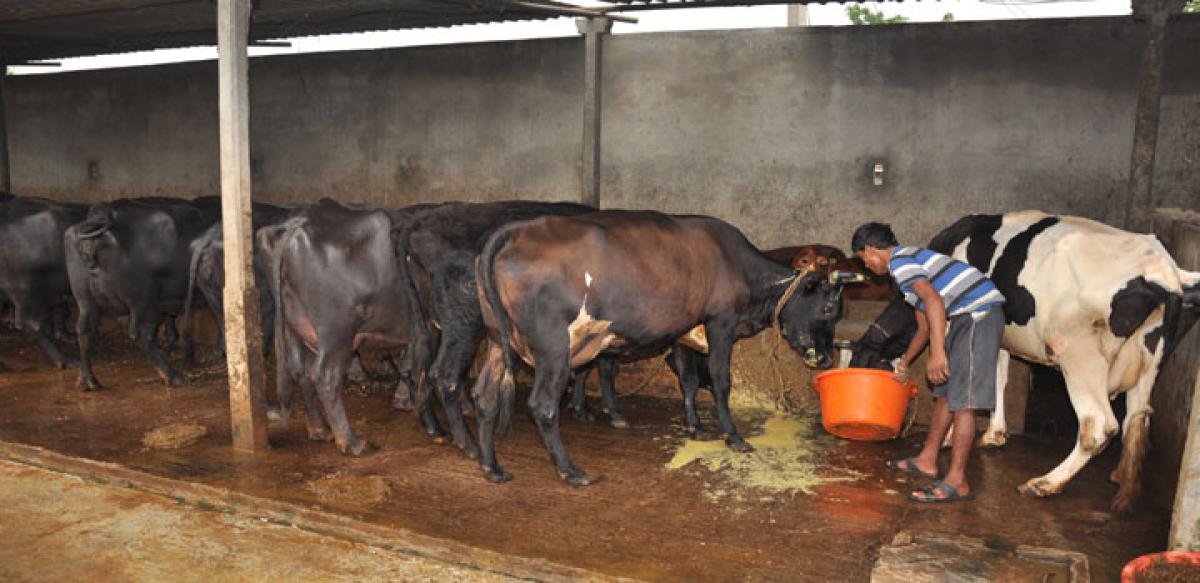Live
- Polling concludes in Maharashtra and Jharkhand Assembly elections
- Chhattisgarh CM Sai briefs HM Amit Shah on progress in Maoist-affected areas
- Bengal PDS case: ED seeks report on medical conditions of jailed former minister
- Siddharth's Romantic Drama Miss You Set to Hit Theaters on November 29
- India’s 1st AI data bank to boost national security launched
- Humbled to receive 'Key to the City of Georgetown', says PM Modi in Guyana
- 11 lakh BPL cards revoked, claims K’taka BJP
- Exit polls results indicated victory of the NDA government in Maharashtra and Jharkhand!
- Deputy CM Bhatti Vikramarka Reviews SC/ST Development Funds Implementation
- AP cabinet approves key decisions, check here
Just In

Gone are the days where cattle are given injections to increase milk production. Dairy farmers in Prakasam district have come across a new way to increase milk production and drought conditions have played their part.
New fodder for thought

- Farmers opt for molasses-rich waste from breweries, due to lack of traditional fodder
- Animals, which are addicted to molasses feed rejecting traditional feed
- Veterinarians warn of possible health complications for animals
- Milk from molasses fed animals harmful, if not treated
Ongole: Gone are the days where cattle are given injections to increase milk production. Dairy farmers in Prakasam district have come across a new way to increase milk production and drought conditions have played their part.
Lack of fodder for milch animals, especially buffaloes has led dairy farmers to use molasses rich waste from breweries as a fodder. Experts say that the milk from molasses rich brewery waste consuming buffaloes, though rich in protein and low in fat, reeks of foul smell and likely to be dangerous to children.
The increasing scarcity for fodder and cattle feed forced dairy farmers to resort to this practice, which produces more milk at the cost of health of the buffaloes. It should be noted the product which was occasionally used earlier as a tastemaker has become the prime fodder. In a rather new twist to the story, the cattle has become addicted to the molasses rich fodder and are reluctant to consume green fodder, creating a new problem.
Molasses, a raw material used in sugar factories and breweries is an addictive. Breweries in Vijayawada, Visakhapatnam and Nandyal offered the molasses rich waste to the farmers for free on condition that they would bear the transport charges. Later, as the animals got addicted to it and with the subsequent increase in demand, the waste was sold at Rs 4 to 5 per kg apart from selling molasses syrup.
The farmers in Prakasam district are importing about 2,000 litres of molasses every day to feed animals. They claim that the increase in price of traditional fodder is forcing them to opt for molasses. Lakshmi, a dairy farmer from Gadipartivari Palem said, “Though the Ongole dairy supplies feed for the animals, the milk production is very low.
We need to purchase the fodder, green grass, jaggery along with the millets and other items to feed the animals. The investment on the feed of the buffaloes is increasing day by day but the price for the milk is not revised. We cannot increase the milk produced by buffaloes with the traditional feed. We observed that the buffaloes are giving more milk when fed with waste breweries. When molasses is added, the milk production increased by 60- 80 per cent.”
However, the quest for more milk production has boomeranged on the farmers as the cattle started rejecting traditional feed. They are now facing a double whammy with inconsistent supply from breweries. Malleswari, a farmer from Reddy Nagar near Chimakurty said, “Breweries are not supplying adequate molasses, they increased price of the waste and molasses by Rs 2 to 3 per kg. We need to feed a buffalo about 3 to 4 kg of the waste and 0.5 to 1 litre of the molasses every morning and evening, which is becoming a burden. If we don’t have molasses, the animals are rejecting the green feed and the milk produced is reduced by 2 to 3 litres.”
The practice of feeding molasses is not doing any good to the farmers, as animals are dying, when consumed in excess. Dr Z Srinivas Rao, veterinary assistant surgeon said, “The molasses or the waste from the beer factories though rich in carbohydrates, should not be fed to animals in large quantities. The acid produced in the digestion process, generates gas which leads to breathing issues to animals.”
Echoing the same Dr Rajani Kumari, Joint Director of the Animal Husbandry Department said that the farmers shouldn’t use excess molasses. “The milk produced from the buffaloes fed with the molasses and waste from breweries, will have a foul smell and the milk products lack taste. We are educating the farmers not to use molasses.”
Doctors opine that the milk produced from these animals will be harmful to children, if it is not properly treated. Dr Sravan Kumar of Sanghamitra Hospitals said, “The milk would be rich in proteins and low in fats and it would also contain a large amount of bacteria. If the milk is not pasteurized well before using, the consumers would definitely face health problems like indigestion and stomach-ache etc. If the milk is fed to the children, they also suffer from stools and other issues of indigestion. This practice of feeding molasses should be stopped in the larger interest of protection of public health.”

© 2024 Hyderabad Media House Limited/The Hans India. All rights reserved. Powered by hocalwire.com







